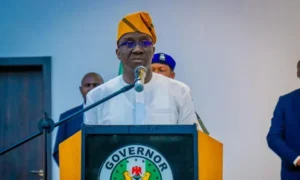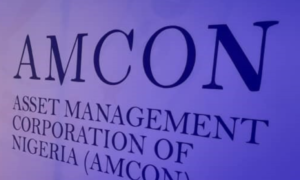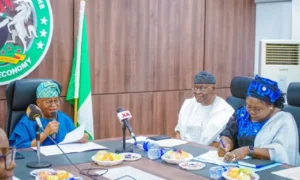Monetary policy chiefs at the Central Bank of Nigeria (CBN) and the broader economic policy czars at the Presidency, will need to move fast to look for a big stash of dollars of between $5 billion and $10 billion..
The need of the dollar is to bring some stability to the downward spiral the naira now finds itself following the reforms introduced in the foreign exchange market by President Bola Ahmed Tinubu since taking office on May 29.
But beyond this immediate requirement to arrest what is appearing to look like policy implementation without adequate preparations, even reflection, a think tank, Agora Policy, in a new policy paper released over the weekend, has outlined medium and long term policy features in the form of recommendations to the authorities to deal with the longstanding shortcomings in Nigeria’s exchange rate management.
Before considering the medium and long term measures to tackle Nigeria’s exchange rate management challenges, the authority will do well to tackle unfolding and near-term concerns, Agora admonished.
“To stabilise the present spiral, Nigeria needs a big stash of dollars and fast! Policymakers must look to strike the iron while it is hot to avoid reform fatigue by seeking out sources of large USD liquidity on concessional terms by exploring the option of a standby arrangement from multilateral agencies of significant scale ($5-10 billion) with the objective of acquiring credibility,” the Agora Policy paper advised.
The tone of urgency contained in this advice stems from the critical position that the country and its currency now finds themselves, especially with the lack of dollar liquidity as a result of monumental failings by governments over the years to diversify the economy and make it less dependent on crude oil for most of its foreign exchange earnings.
The Agora report author noted that while the huge stash of cash required for this task might be daunting, the country has the credibility for the right partnerships to catalysed capital flows.
“Having front-loaded fiscal consolidation and external sector adjustments, Nigeria has the credibility to embark on key partnerships to catalyse increased capital flows. While this is politically tricky, desperate times call for bold and desperate measures.
The global geopolitical environment means Nigeria has a window to obtain this funding if it is ready to push the envelope.
These dollar flows are necessary to give the market ‘time to breathe’ as left unsolved, the Naira could come under fresh speculative pressures which might drive a return in policy makers towards the much pegged arrangement they recently jettisoned,” the Agora policy paper stated.
It advised that the CBN must look to be flexible in thinking, noting that “there are several variants of flexible FX regimes and we should be pragmatic to not rule out any options,” adding that the goal is to ensure that FX adjustments reflect the trends in balance of payments in a credible manner over the near and medium term.
Indeed, for the medium and long terms, Agora Policy, which appears to be responding to recent developments in Nigeria’s foreign exchange management quagmire, in the paper, offers six features that the recent transition from fixed to floating exchange rate regime must have for the policy to deliver positive outcomes.
The paper noted that, “mere FX adjustments to adapt to reality may lead to short-lived gains, followed by a return to previous practices,” but that in order to avoid such a cycle, “forex and monetary policies should be part of a comprehensive economic plan where the exchange rate serves as a tool for export diversification and for attracting capital flows to foster overall development.”
Accordingly, it declared that successful fixed to floating transitions are characterized by certain key features, noting that these features should be taken on board by Nigeria’s policy makers for the medium to long term success of the policy.
Agora noted that one feature is that there should be a clear role for exchange rates within the context of broader economic strategy. In this regard, the exchange rate is a key input variable within the context of an economy, “as it serves as a measure of relative prices between a country and its trading partners.”
It observed that given that the long-stated objective of Nigeria’s policymakers is to diversify its export base, to ensure export competitiveness of these non-oil exports, “exchange rate policies must look to deliver an extra layer of competitiveness to export prices in a form that favours domestic industries.”
In this regard, “the goal of policymakers on FX is not nominal exchange rate stability but real exchange rate stability with an undervaluation bias,” adding that Nigeria’s FX policy must look to ensure a balance between real exchange rate stability that ensures non-oil export competitiveness and keeps inflation at a level supportive of domestic welfare.
The Agora Policy paper also declared that Nigeria’s economic managers must explicitly seek to achieve this balance and must demonstrate annually how their policy measures or adjustments deliver on these goals.
The other feature that the market needs to demonstrate is a deep and liquid FX market. With this feature, it stated that in creating a workable FX market architecture, “policymakers must envision a distinct set of supply forces i.e. multiple FX sources which can be attained by removing all forced sale rights on oil exports presently held by the CBN,” adding that a credible FX reform will end the forced petro-dollar to Naira conversions financed via the printing of new money.
Agora Policy also found another feature to be a consistent focus on price stability, adding that “Nigeria’s central bank must have an explicit inflation targeting framework with clear annual and inter-mediate inflation targets that are publicly known and must annually demonstrate how its policies achieve this objective.”
Also, it noted that curtailing information asymmetry through increased transparency and clear communication is another feature. Agora added that to help proper FX pricing, Nigeria’s central bank must work to deliver increased information about demand and supply trends and end the dark ages on critical data on trends across FX markets.
“As in some markets like Singapore, the CBN legislation must include requirements for publication of period data and analysis of trends in FX markets to the public,” it stressed.
Another feature is the presence of institutional mechanisms for hedging volatility, Agora Policy noted, adding that “beyond developing deep and liquid spot markets, concerted efforts must be on including avenues for hedging without any arcane restrictions that look to curb speculation. The CBN should work with exporters and financial institutions to develop the means for importers to hedge against FX volatility risk to prevent demand front-loading.
Nigeria should work actively to ensure that the large USD flows (including remittance flows) equilibrate within the official segments.”
Finally, it suggested that there has to be a clear framework for FX interventions, noting that, “Market failure is a feature of still forming markets and Nigerian policymakers must be clear-eyed to have a system for dealing with periods when markets become volatile. Thus, there must be a clear operational framework for dealing with periods of external shocks which should include providing temporary US liquidity, interest rate adjustments, and communication and FX adjustments.”













